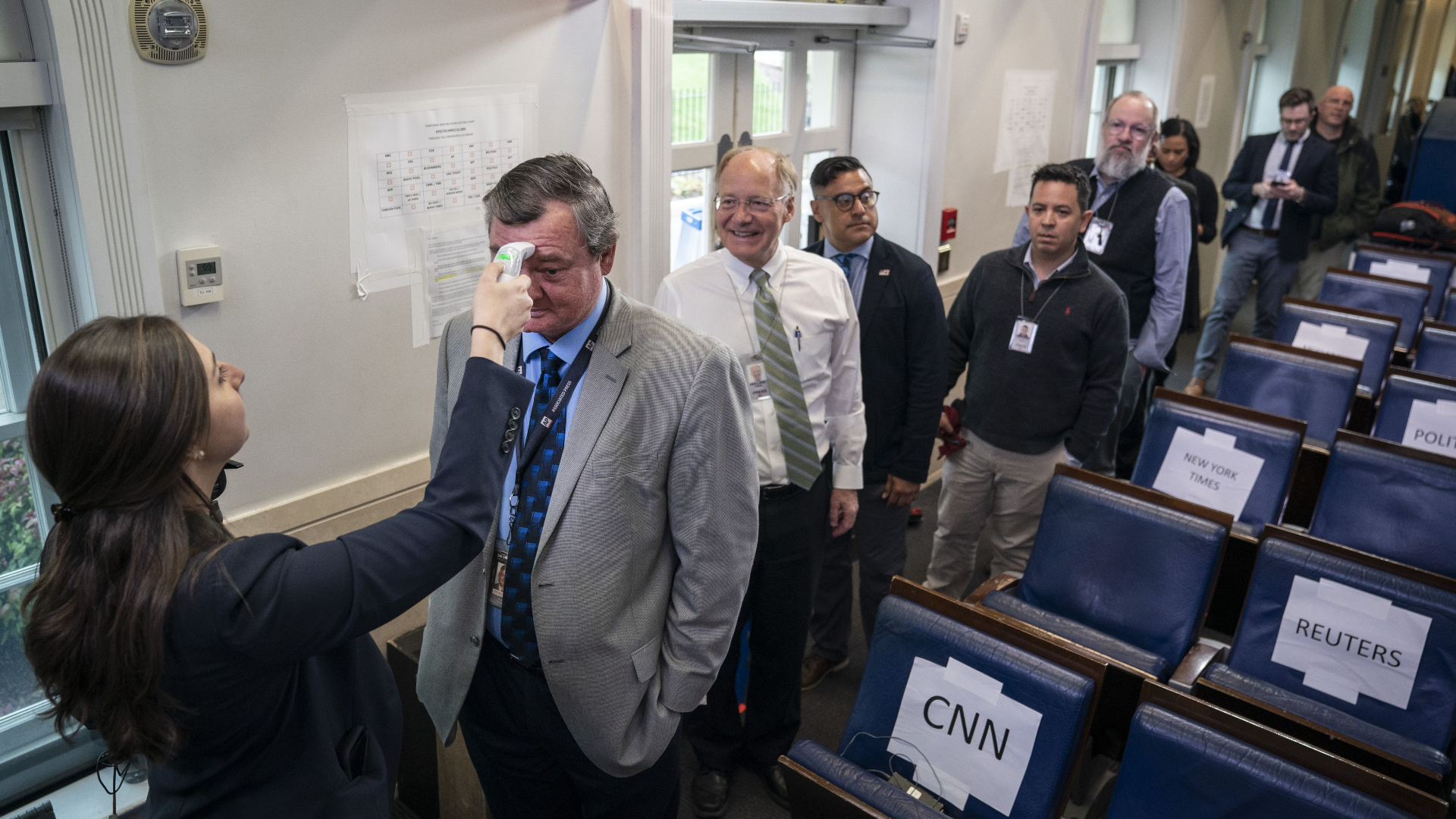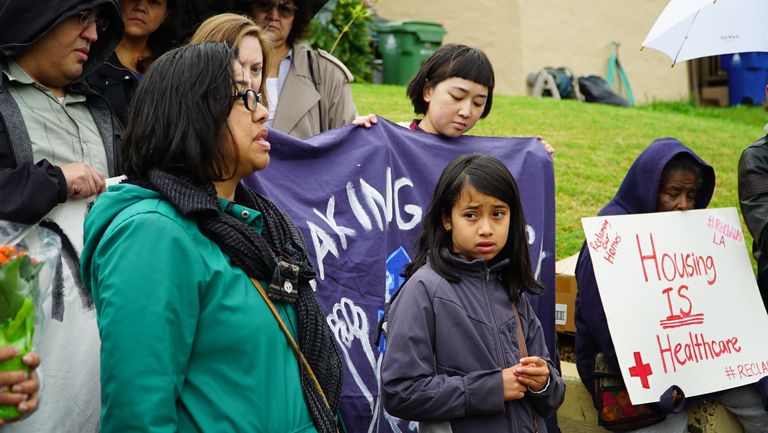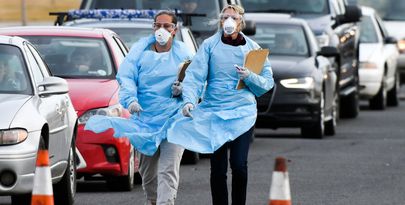COVID-19 Exposes the Dangers of Gender Inequality
Time's Up CEO Tina Tchen argues that stronger paid leave policies could have prepared the U.S. to better respond the coronavirus outbreak.

Select the newsletters you’d like to receive. Then, add your email to sign up.
You are now subscribed
Your newsletter sign-up was successful
Want to add more newsletters?

Delivered daily
Marie Claire Daily
Get exclusive access to fashion and beauty trends, hot-off-the-press celebrity news, and more.

Sent weekly on Saturday
Marie Claire Self Checkout
Exclusive access to expert shopping and styling advice from Nikki Ogunnaike, Marie Claire's editor-in-chief.

Once a week
Maire Claire Face Forward
Insider tips and recommendations for skin, hair, makeup, nails and more from Hannah Baxter, Marie Claire's beauty director.

Once a week
Livingetc
Your shortcut to the now and the next in contemporary home decoration, from designing a fashion-forward kitchen to decoding color schemes, and the latest interiors trends.

Delivered Daily
Homes & Gardens
The ultimate interior design resource from the world's leading experts - discover inspiring decorating ideas, color scheming know-how, garden inspiration and shopping expertise.
Women now represent a majority of the U.S. workforce —but in addition to their paid employment, they still take on the majority of unpaid household labor and care work. From breadwinner to bread maker, client care to child care, women spend 102 more hours a year than men on unpaid chores and family care. This deeply-ingrained gender imbalance is known as the “second shift.”
Now, as COVID-19 forces schools to close, businesses to shutter, and hospitals to ration care, many women have to do even more with even less, creating a veritable “third shift” that endangers everyone’s health and well-being. It doesn’t have to be this way. Congress can step up and pass legislation that immediately—and permanently—provides all working people with paid sick days and paid family leave to care for sick loved ones.
Right now, the United States is one of only two OECD countries in the world that does not guarantee workers paid leave for personal illness, leaving some 32 million U.S. workers without access to a single paid sick day. While 11 states, including the District of Columbia and 22 other jurisdictions, have passed paid sick leave laws, this is far from adequate. Everyone, at all times, but especially in the midst of this unprecedented public health crisis, needs paid sick days, no matter where they live or the size of their employer.
The inadequacy of U.S. policies to protect workers leaves all of us at greater risk.
The lack of paid sick days in the United States hurts all working families. The impact, however, is felt most acutely by women, particularly those in low-wage jobs and women of color. More than half of Latinas and one-third of Black women do not have the option to take paid time off when they are sick and seven out of 10 workers in low-paid jobs do not have paid sick days.
And that leaves all of us at greater risk. Studies show that if a worker lacks sick leave, they are 1.5 times more likely to go to work when they feel sick. Sick workers who show up at their jobs—at childcare centers, nursing homes, or offices—threaten not only their own road to recovery, but also the health of those around them. Unfortunately, the workers who most often interact with the public, like nurses, housekeepers, social workers, and caregivers, are the least likely to be able to heed the CDC’s advice to stay home if they are sick. Coupled with school closures and an increasingly strained health care system, these systemic racial and gender inequities that are dangerous in the best of times become potentially deadly in the face of a global pandemic, COVID-19.
Women are also usually responsible for the care of sick loved ones. According to a recent study on unpaid caregiving, 60 percent of unpaid caregivers are women, meaning many women are responsible for taking care of sick relatives, aging parents, and children, all while working low-wage jobs to make ends meet. For women of color, the burden is even greater, with Black family caregivers spending an average of 28.5 more hours per month caregiving than white family caregivers. Lack of paid leave means many women might have to leave vulnerable loved ones at home alone, or lose income to stay home and care for them.

No one should fall into financial ruin or experience hardship in the workplace simply because they need to take time off from work to care for a new child, tend to an ill family member, recover from an injury, or help stop the spread of the coronavirus. Congress has taken an important step forward by crafting emergency paid sick days legislation, but this legislation falls far short of what is needed to flatten the curve and ensure all workers can take time off to protect their own health and the health of those around them.
Get exclusive access to fashion and beauty trends, hot-off-the-press celebrity news, and more.
The emergency aid package, called the Families First Coronavirus Response Act, which President Trump signed on March 18, establishes federal emergency paid-leave benefits, but only for some. It mandates that private employers with fewer than 500 employees provide two weeks of paid sick leave if employees can't work due to quarantine, COVID-19 symptoms, or if they have to care for a child or family member impacted by COVID-19. Small businesses of less than 50 employees may be exempt, so about 12 million workers may not qualify. An additional 6.5 million people who work for companies of over 500 people who in 2019 did not have paid sick days are also at risk.
We need paid sick leave for all workers permanently, including after this crisis passes, because no one should have to choose between their job and their health or the health of their family at any time. We don’t have a moment to lose. Too many lives are at risk.
Employers don’t have to wait for public policymakers to act, they can extend paid leave on their own. By investing in their workforce, employers can retain their trained and committed workers and emerge stronger and ready to move forward as our economy comes back.
That’s why we all have a responsibility to do our part to protect our communities, whether you are a business leader who can provide paid sick days to your workers or an individual who can use your voice to help make paid leave a reality for all workers, without exceptions.
The need for paid sick leave isn’t new, but it’s more urgent than ever.
Tina Tchen is the president and CEO of TIME’S UP Now, which works to create safe, fair, and dignified work for all by changing culture, companies, and laws. Text NOW to 306-44 to join the fight.
For more stories like this, including celebrity news, beauty and fashion advice, savvy political commentary, and fascinating features, sign up for the Marie Claire newsletter.
Related Stories

